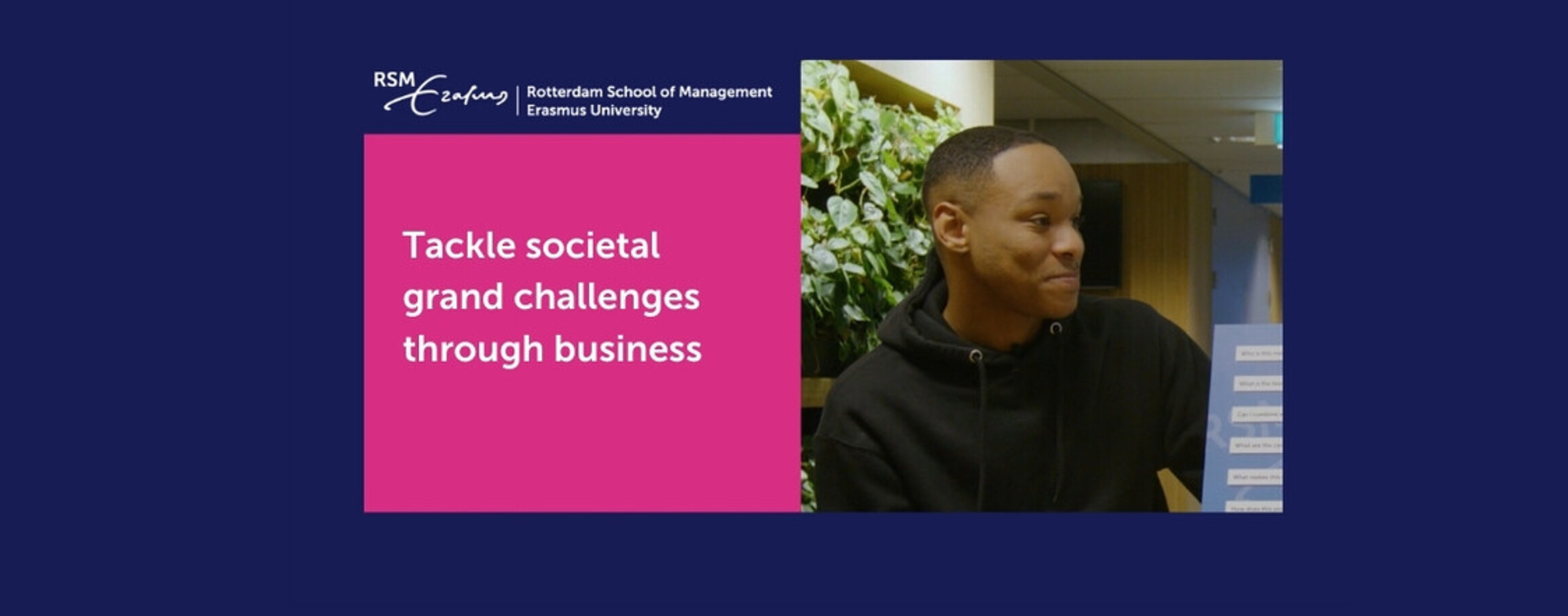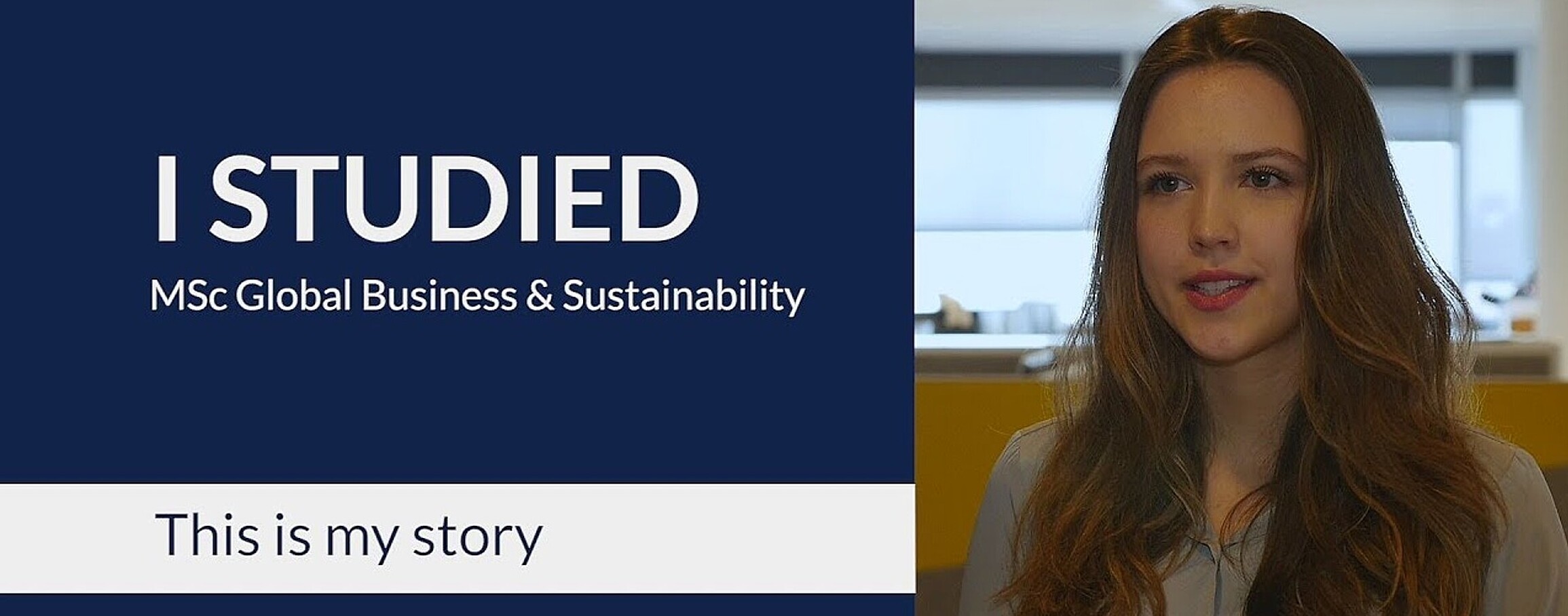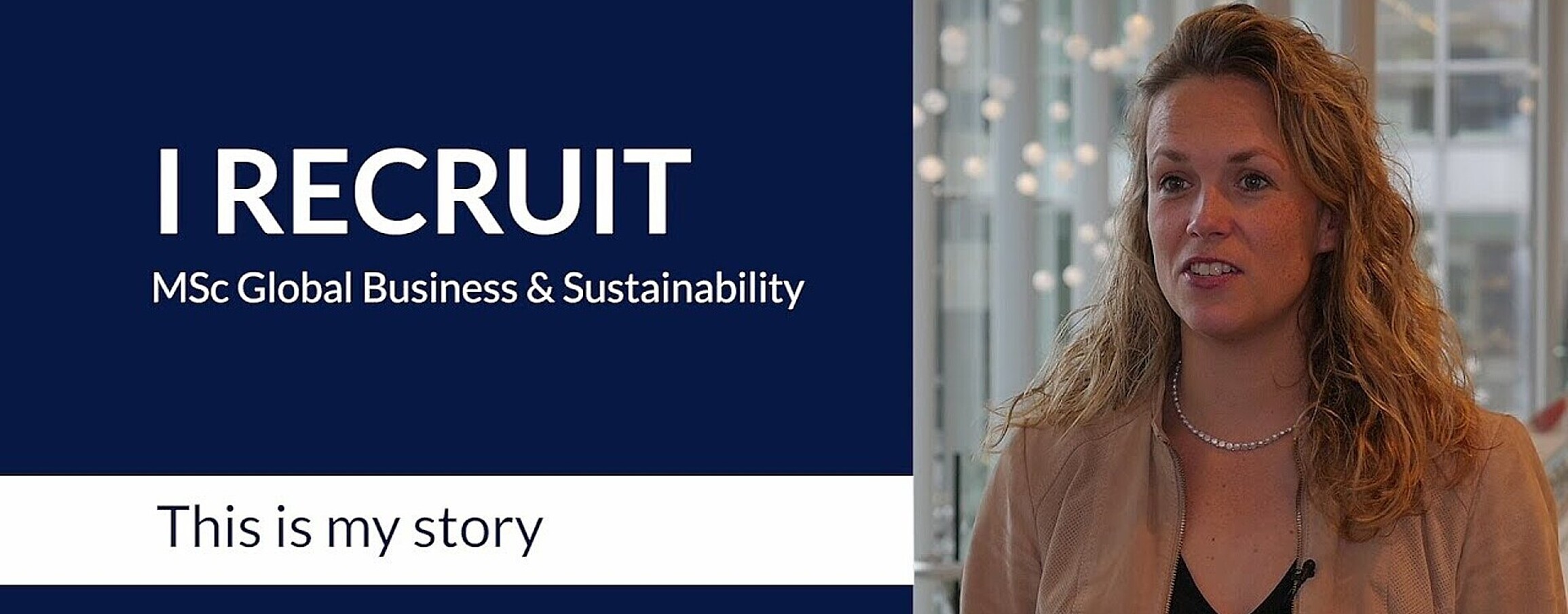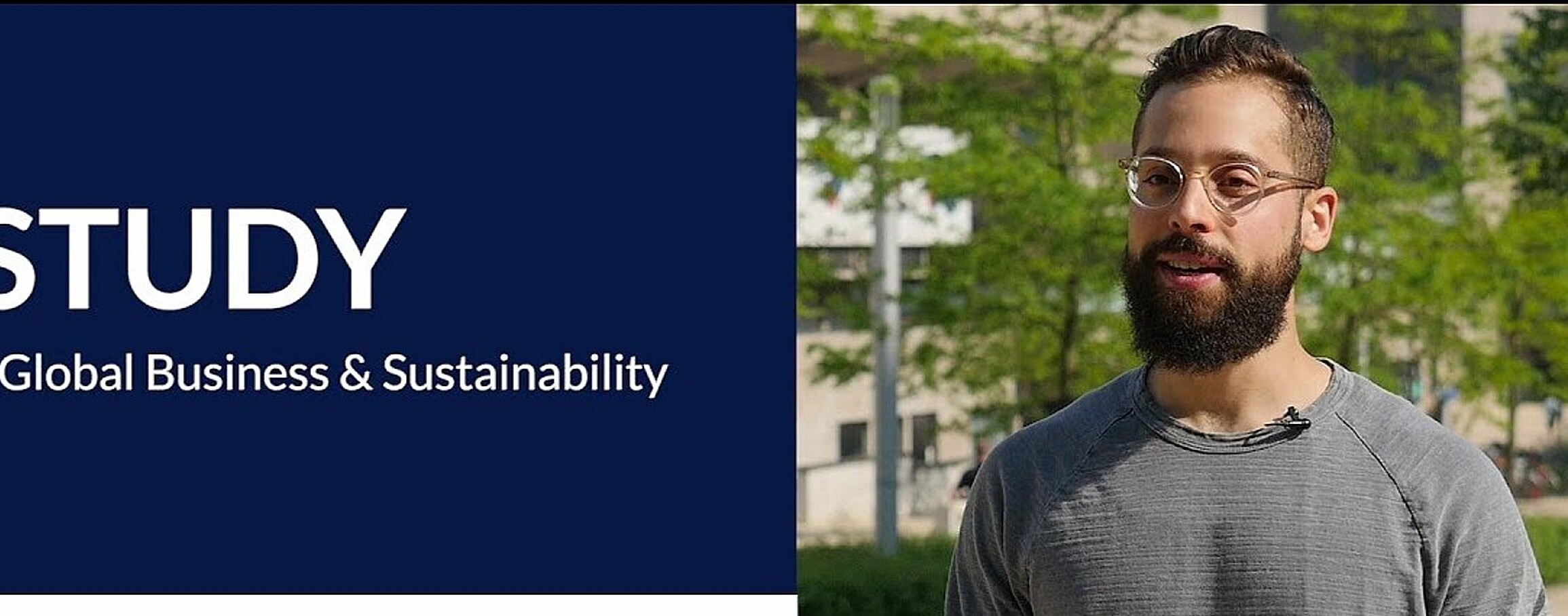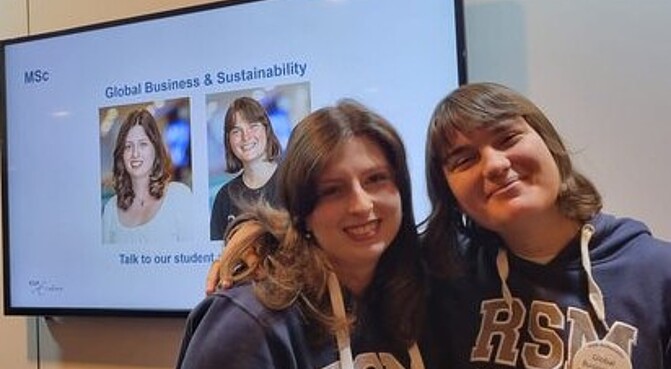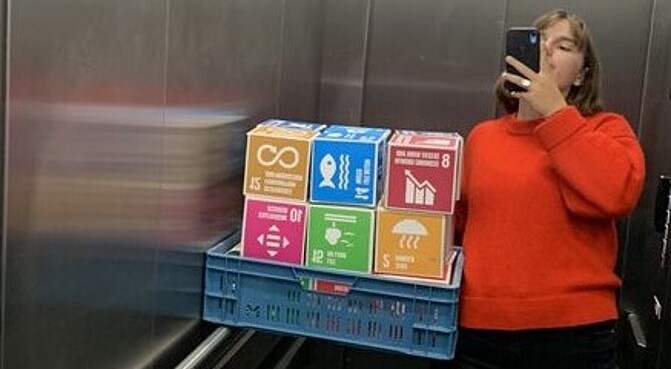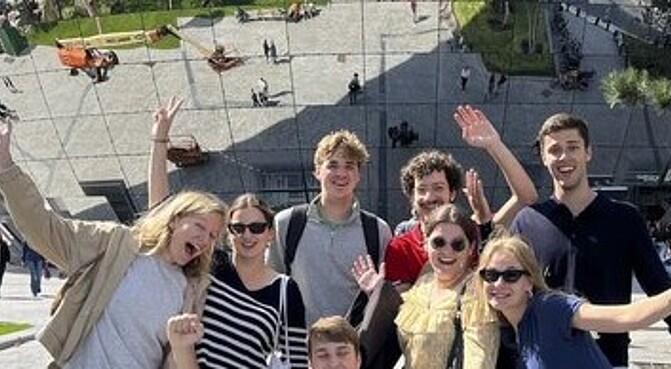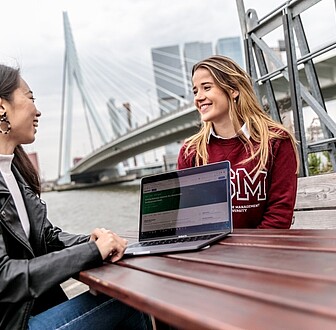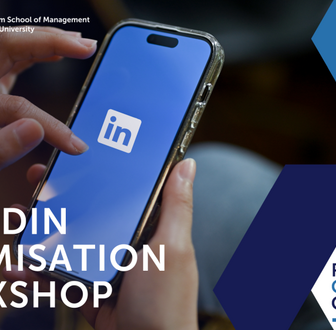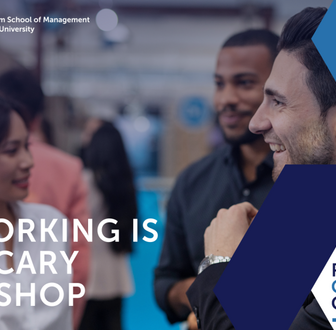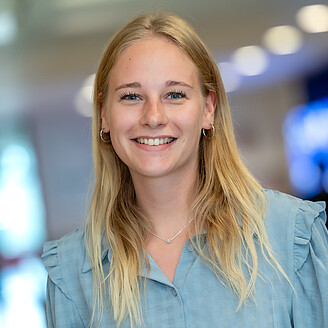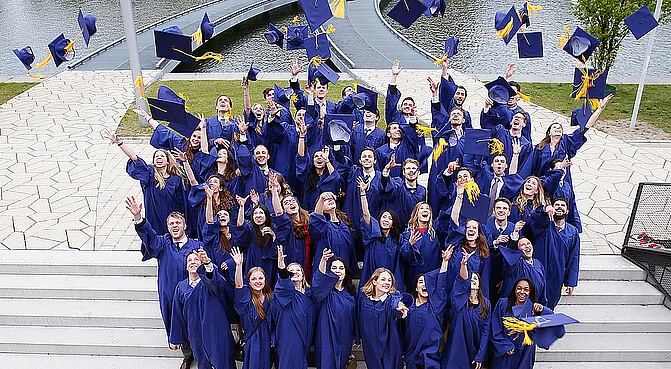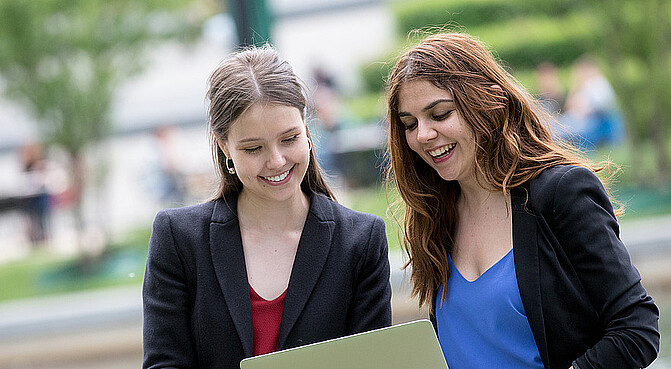Do you want to know more about the MSc Global Business & Sustainability?
The video below will answer the most frequently asked questions about the programme.
RSM’s MSc Global Business & Sustainability is a one-year programme. The courses are designed to provide you with the knowledge, skills and attitude for a meaningful career in a new paradigm of business. The compulsory core courses* are worth 26 ECs and take place in the fall semester and in January. Elective courses (worth 18 ECs) take place in the spring semester; you can choose one elective from another MSc programme. Your master thesis is written during the academic year and is worth 16 ECs. You can extend the programme by applying for an exchange semester in another country.
The MSc Global Business & Sustainability is a signature programme of our academic Department of Business-Society Management. Outcomes of our globally recognised research on the sustainability, responsibility and ethics of organisations in society are directly taught in this master programme.
You will:
- Understand organisations embedded within sustainable social-ecological systems
- Learn tools and frameworks so you can apply your knowledge to tackle grand societal challenges
- Challenge the current status quo and critically ask ‘is this the way things should work?’
- Engage with expert practitioners, including during guest lectures and live business cases with partner organisations, so that you can create your own new solutions for sustainable business practice.
*One core course is called Sustainability Grand Challenges. In November 2024, the challenge focused on water security. The course brought together theoretical insights and real-world applications, equipping students with the tools to approach complex sustainability issues. Read all about it in this news article.
This master is a full-time programme, meaning that its workload is very likely greater than it was in your bachelor programme. While some students do manage to enjoy extracurricular activities, you are expected to follow on-campus classes several days per week, including for mandatory teaching activities such as seminar groups.
Please note that core courses and electives are subject to change each academic year. While some electives are very popular and we can place most students in the elective(s) of their choice, there are no guaranteed places.
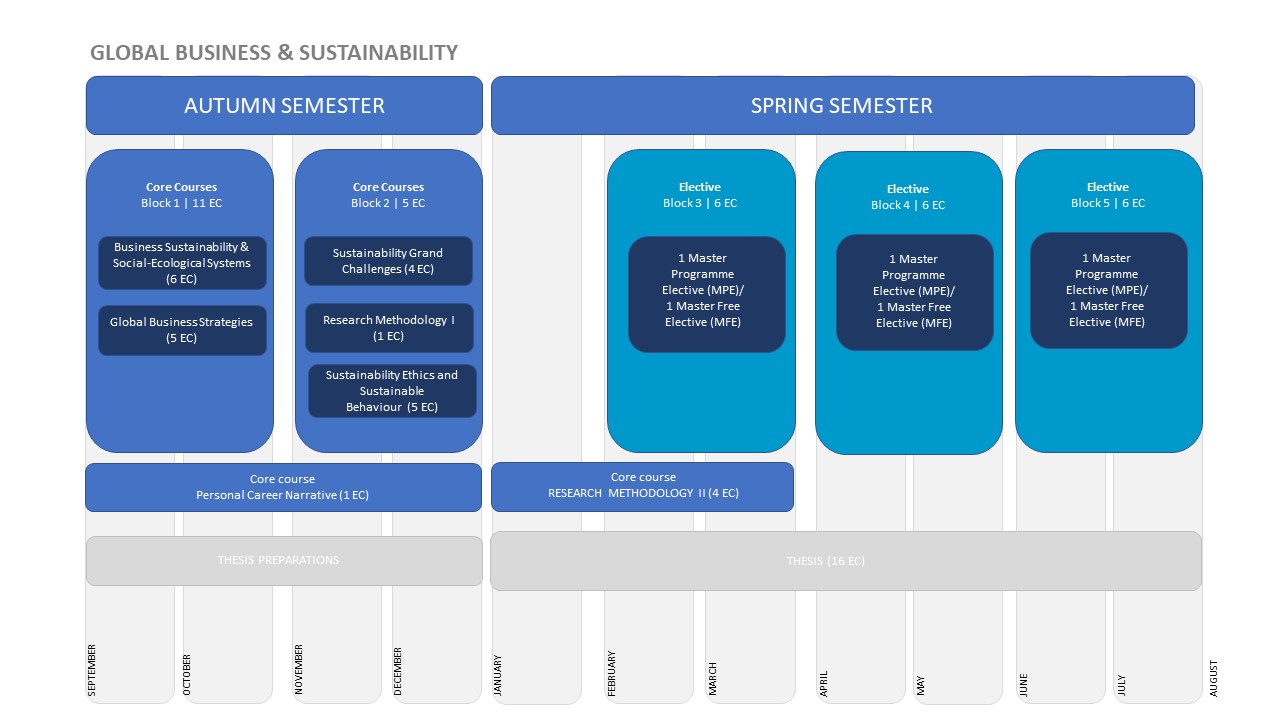
- Business Sustainability and Social-Ecological Systems (6ECs) broaden your understanding of sustainability, allowing for a holistic recognition of the interconnectivity of issues and their impacts on the future of business.
- Global Business Strategies (5ECs): analyse and formulate strategies through which multinational enterprises can contribute to resolving the challenges defined in the UN’s Sustainability Development Goals.
- Sustainability Ethics and Sustainable Behaviour (5ECs): reflect on how managers can make moral, sustainable decisions using theories such as normative stakeholder theory, deontology, and environmental ethics.
- Sustainability Grand Challenges (4ECs): create new business solutions for a real societal problem, and pitch it to a multi-stakeholder jury.
- Personal Career Narrative (1EC): approach your own professional development and job search process with clarity of purpose and confidence, allowing you to secure job interviews and succeed in them.
Our elective portfolio is updated annually to reflect developments in the business sustainability landscape, and is closely connected with practice.
- Circular Economy
- Climate Change Strategy Roleplay
- Corporate Social Investors as a Force for Positive Change
- Cross-sector Partnerships for Sustainable Development
- Managing NGOs
- Movement for Change
- Organisation-Based Research Project
- Organisations and Natural Environment
- Social Entrepreneurship
- Sustainability Accounting and Reporting
- Sustainable Business Models
- Sustainable Finance
- Sustainable and Equitable Food Strategies
- Business, Lobbying, and Sustainability Policies: The Short- and Long-Term Impact
*Please note that certain electives may be very popular. Although we can place most students in the elective(s) of their choice, there are no guaranteed places.
For a detailed description of all of the courses including electives, please view the course catalogue (for reference only, catalogue continually updated throughout the year).
In the research methodology courses, you will:
- Develop your research topic and research question for your thesis while critically reviewing relevant literature
- Practice making informed choices about the research methodology for your thesis
- Learn to design and conduct sound qualitative and quantitative research in the area of sustainability management.
Research proposal and thesis track
Your research proposal must be evaluated as a ‘pass’ before you can start your master thesis track. The research proposal and thesis track officially starts in January, and you have until mid-March to hand in your research proposal to your coaches and co-readers. If you receive a pass for it, then you can officially start writing your master thesis.
Learn more
You can get a taste of working life – from large multinationals to fast-growing start-ups – by applying your new wealth of knowledge to a real company problem during your internship, which is optional in your programme. The RSM Career Centre will support you in finding a suitable position. Many students acquire their first job after graduation from the contacts they make during their internship.
Explore the world and broaden your study experiences by going on international study trips and exchanges at other top schools. RSM has an extensive partner school network of more than 100 business schools and universities worldwide, including top business schools such as ESADE in Barcelona and The Wharton School in the USA. An international exchange is an optional element after you’ve studied for your master for at least one year.
As sustainability becomes ever more important to organisations around the globe, companies are demanding graduates with the knowledge and skill sets to help them navigate new business environments and transform operations. A recent LinkedIn study found that for the past few years the demand for these skills has significantly outstripped supply. Our programme aims to remedy this by providing you with the right kind of knowledge and business skills to make a positive impact in organisations.
Global Business & Sustainability students often have their first job lined up before they graduate. Most others find theirs within a few months of graduation, and many say finding a job was relatively easy, particularly when they invested in their career progress via our Personal Career Narrative core course or via career events for MSc GBS students and for RSM students.
Here’s where GBS alumni work:
- around 60% work in the private sector or founded their own company
- 25% work for governments
- 15% work for non-profit or non-governmental organisations (NGOs) or have founded their own NGO.
Career possibilities include designing and implementing circular projects, estimating risk profiles for country investments, being a policy maker, being a consultant in sustainability or ethical trading, auditing responsible investments, or joining the sustainability team of any organisation.
Here are some examples of positions held by our graduates:
- Sustainability Manager
- ESG Analyst;
- Sustainability Consultant
- Environmental and Social Risk Advisor
- Business Developer
- Social Entrepreneur
- ESG Auditor
- Circular Economy Advisor
- Government/ International Organization Policy Officer
- Sustainable Supply Chain Controller
- Product and Process Manager
- NGO Manager
- Corporate Sustainable Finance Associate
- PhD Student
Curious to see what our alumni are doing?
Good to know
Non-EEA nationals who have earned a diploma from a higher education institute in the Netherlands can apply for a special residence permit called the orientation year after completing their studies. The 'Orientation Year for Graduates Seeking Employment' is a residence permit aimed at retaining foreign talent for the Dutch labour market. During this orientation year you are free to work without a work permit. Participants who find a job during this period can change their orientation year into a residence permit for Highly Skilled Migrants under more favourable terms.
For the most up-to-date information please visit the following website.
What's next after your studies? The RSM Career Centre is your guide for an impactful career. Its expertise in the labour market, personal branding and connections with employers will prepare you for your business career. Get ready for some exciting job fairs, workshops, speed interviews and coaching. You may land your first internship or job before you even graduate!
Alumni are invited to stay connected to the programme, to current students and to each other through events, guest lectures and mentoring as well as through their informal and business networks. This allows you to learn more about the latest sustainability insights in practice. It is also common for students to find a research project or career opportunity via alumni. And when you graduate, we will invite you to join our alumni network, hoping you will stay in touch with the RSM Global Business & Sustainability community.
Talk to our current students!
Meet Vivi
“Hi, I’m Vivi. Born and raised in Taiwan, I pursued my bachelor’s degree in marketing in Hong Kong. Sustainability has always been a passion of mine, and I gained valuable experience through a related internship before joining RSM. After graduating, I worked in consulting to gain broader industry exposure and hone my problem-solving skills. Now, to align my career with sustainability, I chose this program for its strong academic foundation and robust industry connections. Feel free to reach out if you have any questions!”

Meet Hanna
“Hi! I’m Hanna, and I’m 22 years old. I began my journey at RSM in 2020 with a bachelor in IBA, followed by a master in strategic management. The master wasn’t the right fit for me, so I’m now excited to do a master in Global Business & Sustainability! I’ve chosen to continue my studies at RSM because of its vibrant international community, the opportunities for both academic and personal growth, and the engaging and challenging coursework. Feel free to reach out if you have any questions, I’m here to help!”

Become a GBS student-for-a-day
A great way to meet our students, check out the campus and learn more about GBS is to join a student-for-a-day programme.
When you are a ‘student for a day’, you can join a lecture and take a tour of the campus guided by a current master student ambassador. The date and time of the event depends on your availability and the lecture schedule. If it's not possible to attend a lecture on the day of your visit, a 1 hour campus tour will be provided instead during which you can ask our current master student ambassadors any questions you have.
Student perspectives
The 2025-2026 tuition fee for the MSc programmes is approximately €24,600 for non-EEA students. The Dutch government contributes towards this cost for students who hold a nationality from a country belonging to the European Economic Area(EEA). These students therefore only pay the statutory fee €2,601 in 2025-2026.
For EEA nationals who have already completed a master in the Netherlands (and obtained the diploma) the tuition fee for a 2nd master is approximately €14,400.
Please note that all these tuition fee tariffs are subject to change.
There are other costs associated with the Master programmes, for more information please review the “Other expenses” section below thoroughly.
Scholarships
The number of scholarships is limited and mainly merit based. If a scholarship covers only the tuition fees, be aware that you need to finance your own living expenses (rent, food and insurances) for the duration of your studies. RSM does not offer scholarships for the pre-master programme. We do however offer a maximum of 2 scholarships per academic year to RSM pre-master students enrolling in an MSc programme.
Rotterdam School of Management, Erasmus University (RSM) offers multiple scholarships to prospective students from non-EEA countries who are not entitled to pay the EEA tuition fee, provided their grades are considered ‘excellent’. RSM also offers one scholarship, the Erasmus Trustfonds Scholarship, to students from EEA countries.
Besides scholarships awarded by RSM, there are also scholarships awarded by the Dutch government or other organisations that are available if you meet certain criteria such as nationality, age, etc We have listed some of them below but we encourage you to use resources such as Grantfinder or the Scholarship Portal to find additional scholarships.
- StuNed
- G&D Europe Scholarship
- NN Future Matters Scholarship
- Russia: The Global Education Programme
- LPDP
- OKP
Scholarship tips
- Contact the Ministry for Higher Education in your home country to see whether there are scholarship options.
- We have virtual information session covering all you need to know about scholarships and financial aid. Watch it here.
For students from the Netherlands or the EU/EEA, it may be possible to apply for limited funding towards payment of your tuition fees. Find out whether you meet the nationality and age requirements and read more information about the application process here.
IM/CEMS is a program that - if you are still eligible - entitles you to a maximum of 1 year's use of your DUO entitlements. Students who have received a basic grant and possibly a supplementary grant from DUO in the first year of IM/CEMS and meet the following additional conditions may be eligible for an additional half year (6 months) of financial support, which is equal to the grant received in the last month during the program. Please contact the student counselors for more information.
Conditions Financial Support Fund
Students eligible for financial support due to extended master programmes are those who:
a) are enrolled full-time in a public funded Erasmus University Rotterdam degree programme, which is extended on the base of article 7.4, paragraph 8 of the Dutch Higher Education and Research Act;
b) are enrolled as first enrollment (hoofdinschrijving) in the study programme as referred to under a, for which the student pays statutory tuition fee;
c) for this program, is or was entitled to study finance (prestatiebeurs hoger onderwijs) as referred to in the Wet Studiefinanciering 2000, and during the period corresponding to the study load that exceeds 60 ECs, and is no longer eligible for student finance in the form of an additional grant.
Other expenses
After having filled in all of the necessary application information on the Online Application Form (OLAF) and uploaded the required documents, applicants with a degree obtained outside the Netherlands will be asked to pay a non-refundable €100 handling fee. This fee can be paid online via the Erasmus Payment System which uses either iDEAL (for those with a Dutch bank account) or PayPal (which can be linked to any bank account or credit card worldwide). It is important that applicants complete the payment process as indicated, otherwise the system cannot register the payment.
The additional expenses in addition to tuition and general living costs (see below) vary per programme and may include:
- Study materials such as books, readers and business cases
- Costs involved in kick-off meetings
- Costs related to travel, international excursions and compulsory exchange semesters or internships abroad
Approximately € 300 - 500 (per year), these costs differ per programme.
For a reasonable standard of living in the Netherlands, you should have an income of between €1,235-€1,735 per month depending on your lifestyle. Further information about the costs of living in the Netherlands and related subjects can be found on this website. Below is an example of monthly expenditures:
| Furnished accommodation, including gas and electricity | € 500-1,000 |
| Medical insurance | € 50 |
| Telephone/internet | € 15-40 |
| Food | € 300 |
| Books, recreation, clothing | € 300 |
| Public Transportation | € 50 |
| Total | € average 1235 - 1735 |
| Other potential expenses: | |
| Buying or renting a bike | € 100 - 250 (per year) |
| In private residence (not student housing) yearly municipal and water taxes | € 100 - 300 (per year) |
| Study trip or other study related travel | € 300 - 500 (per year) |
Please ensure, prior to your arrival at RSM, that you have or will have sufficient funding available to finance your stay at RSM. Finding a part-time job, may be an option, but can not be guaranteed. You should therefore not rely on finding other ways to supplement your income during your studies. For additional information on obtaining a part-time job, visit the website of the Nuffic.
For EEA students there are no formal restrictions in finding work in the Netherlands, but students with a lack of Dutch language skills will find it difficult to secure employment. Non-EEA students are subject to labour regulations, which makes the likelihood of obtaining a work permit very small. We therefore ask students not to rely on this possibility. We do not encourage students to combine studies with the heavy workload from a part-time job.
This is a capped programme which means that the application for the September 2025 intake will close either when the maximum number of applications (420) has been reached or 15 May, whichever comes first.
Find out everything you need to know about entry visas & residence permits for non-EU or EEA students at RSM.
Finding housing in Rotterdam can be tricky. To help you in your search for housing, we have compiled some helpful resources

